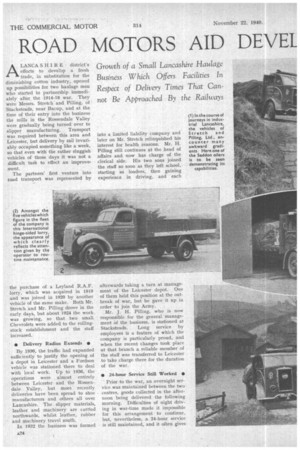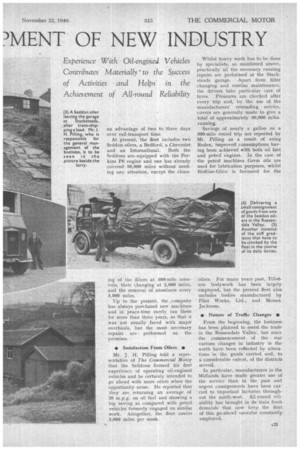ROAD MOTORS AID DEVEI
Page 26

Page 27

If you've noticed an error in this article please click here to report it so we can fix it.
'MENT OF NEW INDUSTRY
LANCA SHIRE district's efforts to devel'op a fresh trade, in substitution for the diminishing cotton industry, opened up possibilities for two haulage men who started in partnership immediately after, the 1914-18 war. They were Messrs. Stretch and Piling, of Stacksteads, near Bacup, and at the time of their entry into the business the mills in the Rossendale Valley were gradually being turned over to slipper manufacturing. Transport was required between this area and Leicester, but delivery by rail invariably occupied something like a week, so that even with the rather sluggish vehicle's of those days it was not a difficult task to effect an improvement.
The partners' first venture into road transport was represented by the purchase of a Leyland R.A.F. lorry, which was acquired in 1919 and was joined in 1920 by another vehicle of the same make. Both NU'. Stretch and Mr. Pilling drove in the early days, but about 1924 the work_ was growing, so that two small Chevrolets were added to the rollingstock establishment and the staff increased.
' • Delivery Radius Extends •
By 1930, the traffic had expanded sufficiently to justify the opening of a depot in Leicester and a Fordson vehicle was stationed there to deal with local work. Up to 1936, the operations were almost entirely between Leicester and the Rossendale Valley, but more recently deliveries have been spread to shoe manufacturers and others all over Lancashire. The . slipper materials, leather and machinery are carried northwards, whilst leather, rubber and machinery travel south.
In 1932 the business was formed afterwards taking a turn at management of the Leicester depot. One of them held this position at the outbreak of war, but he gave it up in order to join the Army.
Mr. J. H. Piling, who is now responsible for the general management of the business, is stationed at Stacksteads. Long service by employees is a feature of which the company is particularly proud, and when the recent changes took place at that branch a reliable member of the staff was transferred to Leicester to take charge there for the duration of the war.
• 24-hour Service Still Worked • Prior to the war, an overnight service was maintained between the two centres, goods collected in the afternoon being delivered the following morning. Difficulties of night driving in war-time made it impossible for this arrangement to continue, but, nevertheless, a 24-hour service is still maintained, and it often gives
an advantage of two to three days over rail-transport time.
At present, the fleet includes two Seddon oilers, a Bedford, a Qhevrolet and an International. Both the Seddons are—equipped with the Perkins P6 engine and one has already covered 50,000 miles without needing any attention, except the clean ing of the filters at 500-mile intervals, their changing at 2,000 miles, and the removal of atomizers every 3,000 miles.
Up to the present, the „company has always purchased new machines and in peace-time rarely ran them for more than three years, so that it was not usually faced with major overhauls, but the most necessary repairs are performed on the premises.
• Satisfaction From Oilers •
Mr. J. H. Piling told a representative of The Commercial Motor that the Seddons formed his first experience of operating oil-engined vehicles and he certainly intended to go ahead with more oilers when the opportunity arose. He reported that they are returning an average of 20 m.p.g. on oil fuel and shawing a big saving as compared with petrol vehicles formerly engaged on similar work. Altogether, the fleet covers 3,000 miles per week. Whilst heavy work has to be done by specialists, as mentioned above, practically all the necessary running repairs are performed at the Stacksteads garage. Apart from filter changing and routine maintenance, the drivers take particular care of fyres. Pressures are checked after every trip and, by the use of the manufacturers' retreading service, covers are generally made to give a total of approximately 90,000 miles running.
Savings of nearly a gallon on a 300-mile round trip are reported by Mr. Pilling as a result of using Redex, improved consumptions having been achieved with both oil fuel and petrol engines. In the case of the petrol machines Germ oils are used for lubrication purposes, whilst Redline-Glico is favoured for the
oilers. For many years past, Tillotson bodywork has been largely employed, but the present fleet also includes bodies manufactured by Pilot Works, Ltd., and Messrs. Jacksons.
• Nature of Traffic Changes • From the beginning, the business has been planned to assist the trade in the Rossendale Valley, but since the commencement of the war various changes in industry in the north have been reflected by alterations in the goods carried and, to a considerable extent, of the districts served.
In particular, manufacturers in the Midlands have made greater use of the service than in the past and urgent consignments have been car-' ried to important factories throughout the north-west. All-round reliability has brought in its train fresh demands that now keep the fleet of this go-ahead operator constantly employed.




















































